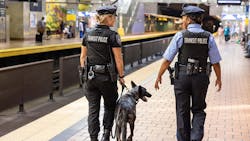SEPTA, TriMet increasing safety efforts to improve rider experience
The Southeastern Pennsylvania Transportation Authority (SEPTA) in Philadelphia, Pa., and TriMet in Portland, Ore., are increasing enforcement of their respective system rules beginning July 1 to improve the rider experience.
SEPTA
SEPTA is launching the return of an enforcement program for quality-of-life violations as part of an effort to discourage incidents, focus on repeat offenders and enhance the customer experience. SEPTA Transit Police will issue Code Violation Notices (CVNs) for low-level crimes, including alcohol consumption, public urination, smoking, littering and other offenses.
Under the policy, SEPTA Transit Police will issue a ticket to the offender and forward a copy of the ticket to the city of Philadelphia’s Office of Administrative Review (OAR). Fines will range from $25 to $150. Offenders will have the option to pay the fine or request a court date. OAR will track unpaid fines and chronic offenders will be banned from entering SEPTA property.
“The shift to Code Violation Notices demonstrates our commitment to stepping up enforcement of quality-of-life offenses,” said SEPTA CEO and General Manager Leslie S. Richards. “These violations are often the subject of customer complaints and can be associated with more serious crimes. Our customers and employees deserve to feel safe when they are traveling on SEPTA.”
Since 2019, SEPTA Transit Police have issued Administrative Enforcement Notices (AENs) for quality-of-life violations. SEPTA notes AENs carry a fine but are not court-enforced. An evaluation of the AEN program determined that it is not effective in deterring anti-social behaviors that negatively impact SEPTA customers.
“Code Violation Notices are legal instruments backed by the courts,” said SEPTA Transit Police Chief Charles Lawson. “With this change, SEPTA is sending a clear message to would-be offenders: If you commit an offense on SEPTA property, you will be held accountable.”
The CVN policy adds to several recent changes aimed at enhancing safety and security on the system. SEPTA Transit Police continue to increase visible patrols across the system, with more officers strategically deployed at stations and on trains, trolleys and buses. SEPTA’s officers in the field are also assisted by a new Virtual Patrol Unit, which utilizes SEPTA’s vast surveillance camera system to help dispatch officers to where they are needed most.
SEPTA says it also remains committed to growing its police force. Recruitment and retention efforts by SEPTA Transit Police have resulted in sustained growth over four straight quarters – from 196 sworn officers at the end of 2022 to the current 230 sworn officers, which is the highest number in years. SEPTA will continue to hire more officers, including exceeding budgeted headcount for SEPTA Transit Police to bolster safety and security. The efforts by the agency resulted in a 45 percent decrease in serious crimes on the system during the first quarter of 2024 compared to the same period in 2023.
TriMet
TriMet’s safety and security staff will start focusing on increasing enforcement on behavior and actions that are expressly prohibited by TriMet’s Code of Conduct.
The agency’s Customer Safety Supervisors will be checking fares and, along with its Customer Safety Officers and Transit Security Officers, they’ll let riders know they need to follow all the rules.
TriMet notes riders without valid fare face a citation with a fine of up to $250 or exclusion from the system. Riders cited for not having proof of fare may have their penalty reduced, depending on their citation history. Riders can avoid a court record by paying a reduced fine, performing community service or, if they qualify, enroll in the agency’s Honored Citizen reduced fare program. People with a disability, those over 65 and veterans, active-duty members of the military or reservists also qualify for the reduced fare.
During the past two years, the agency has done the following to improve comfort and safety on its systems:
- Doubled the amount of frontline safety and security staff, bringing the number to more than 400 employees and contractors.
- More than doubled the number of On Street Customer Service staff.
- Created a Security Operations Command Center to manage incident responses.
- Piloted a program to restrict elevator access to those with a valid form of fare.
- Expanded and made improvements to its network of more than 8,000 cameras.
- Increased its Crime Prevention Through Environmental Design initiatives to improve sightlines and lighting at transit centers, rail station and park and rides, making the areas brighter and reducing hiding spots by cutting back shrubs and tall plants.
The agency has also emphasized cleaner vehicles, platforms and transit centers by hiring more cleaners and maintenance staff as part of the agency’s Clean Team. With more cleaning, customer support and security resources now than ever before, TriMet says they use the Clean Team daily to keep riders and employees moving safely.
About the Author
Brandon Lewis
Associate Editor
Brandon Lewis is a recent graduate of Kent State University with a bachelor’s degree in journalism. Lewis is a former freelance editorial assistant at Vehicle Service Pros in Endeavor Business Media’s Vehicle Repair Group. Lewis brings his knowledge of web managing, copyediting and SEO practices to Mass Transit Magazine as an associate editor. He is also a co-host of the Infrastructure Technology Podcast.

